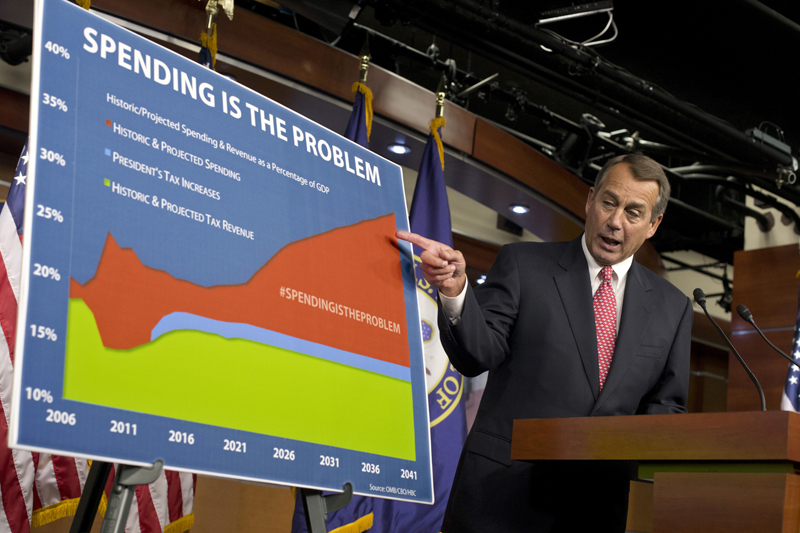WASHINGTON – House Speaker John Boehner has offered to put off any fight over the federal debt limit for a year, a concession that would deprive Republicans of leverage in the budget battle but is breathing new life into stalled talks over the year-end “fiscal cliff.”
The offer came Friday, according to people in both parties familiar with the talks, as part of the latest effort by Boehner, R-Ohio, to strike a deal with President Obama to replace more than $500 billion in painful deficit-reduction measures set to take effect in January.
With the national debt already bumping up against a $16.4 trillion cap set last year, Congress risks a government default unless it acts to raise the debt ceiling in the next few months. Some Republicans had argued that party leaders should use the threat of default to demand additional spending cuts from Obama.
Boehner’s offer signals that he expects a big deal with sufficient savings to meet his demand that any debt limit increase be paired dollar-for-dollar with spending cuts.
That would permit him to keep a key vow to his party — and head off a potentially nasty debt-limit fight — at least until the end of next year.
“Our position has not changed,” Boehner spokesman Michael Steel said Sunday. “Any debt limit increase would require cuts and reforms of a greater amount.”
Boehner’s offer also includes a proposal to raise tax rates for millionaires, generating as much as $460 billion over the next decade — about half what Obama has demanded from the wealthy, according to official estimates.
The White House rejected the offer, saying it would raise too little cash to significantly dent record budget deficits and do nothing to extend emergency unemployment benefits into the new year, according to a Democrat familiar with the talks.
But the tax offer was viewed as a breakthrough, the Democrat said. Senior White House officials remained in contact with Boehner’s staff throughout the weekend in a sign that serious negotiations had finally begun after weeks of stalemate and partisan posturing.
“Recognizing the importance of raising tax rates is a big, positive and important step,” said former White House economic adviser Lawrence Summers, who emphasized that he was not speaking for the Obama administration.
“The evaluation of any deal should depend on how much total revenue is raised, whether adequate demand is maintained to sustain the recovery and whether we are restoring confidence or just marking time until another debt-limit crisis,” Summers said.
Boehner and Obama have not spoken directly since the Friday afternoon phone call when Boehner extended his latest offer.
In all, Boehner’s proposal would generate about $2 trillion in savings over the next decade, split equally between new taxes and spending cuts, according to a Republican familiar with the talks.
The Bush tax cuts would be extended for everyone else under the proposal, averting the biggest of several automatic tax hikes set to rattle the economy in January.
Send questions/comments to the editors.


